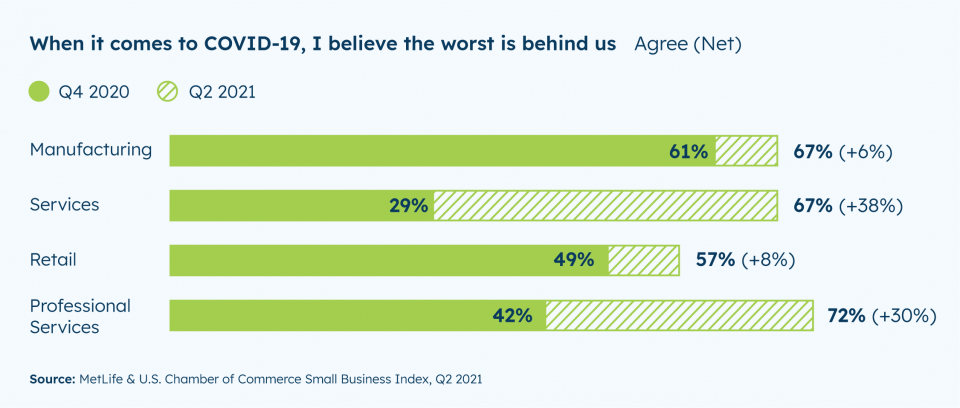16 de Junio del 2021
* Información extraída directamente del portal oficial de la Camara de Comercio de los Estados Unidos (15/06/2021)
As more Americans receive the COVID-19 vaccine, states lift restrictions, and businesses continue to reopen, a majority (65%) of small business owners are more optimistic that the worst of the pandemic is over. That percentage is up 21 percentage points from Q4 2020, according to a poll taken April 21 – May 6 and released today by the U.S. Chamber of Commerce and MetLife.
Significantly, the dominant emotion small business owners are feeling about their current operating or reopening strategy is “hopeful” (44%). Thirty-one percent say they are “comfortable” and 24 percent say they are “concerned,” rounding out the top three current feelings.
“Small businesses are seeing real reasons for optimism this quarter and we’re seeing that reflected in the data,” said Tom Sullivan, vice president of small business policy at the U.S. Chamber of Commerce. “The easing of capacity restrictions due to increased vaccinations means more small businesses are welcoming more customers. Increased foot traffic equates to economic growth and that is moving our country’s recovery forward.”

Fuente: US Chamber of Commerce
As most small businesses believe, the worst is behind us; COVID precautions may stick around for longer. Over three-quarters (76%) of small businesses intend to keep all COVID-19 safety precautions in place until the coronavirus pandemic ends.
Small businesses are very clear on what will help their businesses thrive: both easing COVID restrictions and more vaccinations. Small businesses say that easing COVID-19 restrictions (29%) and ramping up vaccinations in their area (28%) are the two biggest keys to their success in the remainder of 2021.
When it comes to views of the economy, positive outlooks are growing and negative ones are declining. Currently, 27 percent of small businesses rate the overall U.S. economy as good, up from 21% who said the same in Q1. Driving this uptick is the decreasing number of small businesses seeing the economy as bad. While 46 percent continue to say the national economy is poor, this is the first time this measure has fallen below 50% during the pandemic. Just last quarter, fully 60 percent of small businesses said the economy was poor (a drop of 14 points in one quarter). Despite these overall gains, a majority of service-related small businesses rate the U.S. economy as poor (54%), more than any other sector.
Around eight in 10 small businesses report they either opened their business fully as soon as their state allowed it (if already open), or plan to do so as soon as it is allowed (if they are partially open or temporarily closed).
Additional survey findings include:
- Business health consistent from last quarter. Small businesses view their own health as steady and see things improving in the future. Half (52%) of small businesses rate their overall business health as good, unchanged from Q1 2021.
- Revenue expectations jump. Over half (57%) of small businesses anticipate their revenue increasing this year, up 10 percentage points compared to last quarter, marking the most positive outlook of this metric during the pandemic.
- Hiring plans remain steady. Amid national worker shortages, most small businesses anticipate retaining the same staffing level (52% now, 49% in Q1 2021) this quarter. Thirty-two percent plan to increase staffing (same as Q1 2021).
“We have turned a corner regarding the pandemic, and small business owners’ feelings of hope reflect that even while we know we still have some distance to go before we see a full recovery,” said Jessica Moser, senior vice president, Small, and Specialty Business at MetLife. “It is encouraging to see more small businesses rate both the U.S. and their local economies as good, which is driving optimism as we head into the second half of 2021.”
The current Small Business Index score is 60.0. This represents a 4.1 point increase from 55.9 in Q1 2021 and a 20.5 point increase from the all-time low of 39.5 one year ago in Q2 2020. However, the new score remains below findings before the pandemic: the Index score was 71.7 in Q1 of 2020 based on data collected before the full economic impact of the coronavirus became apparent.













